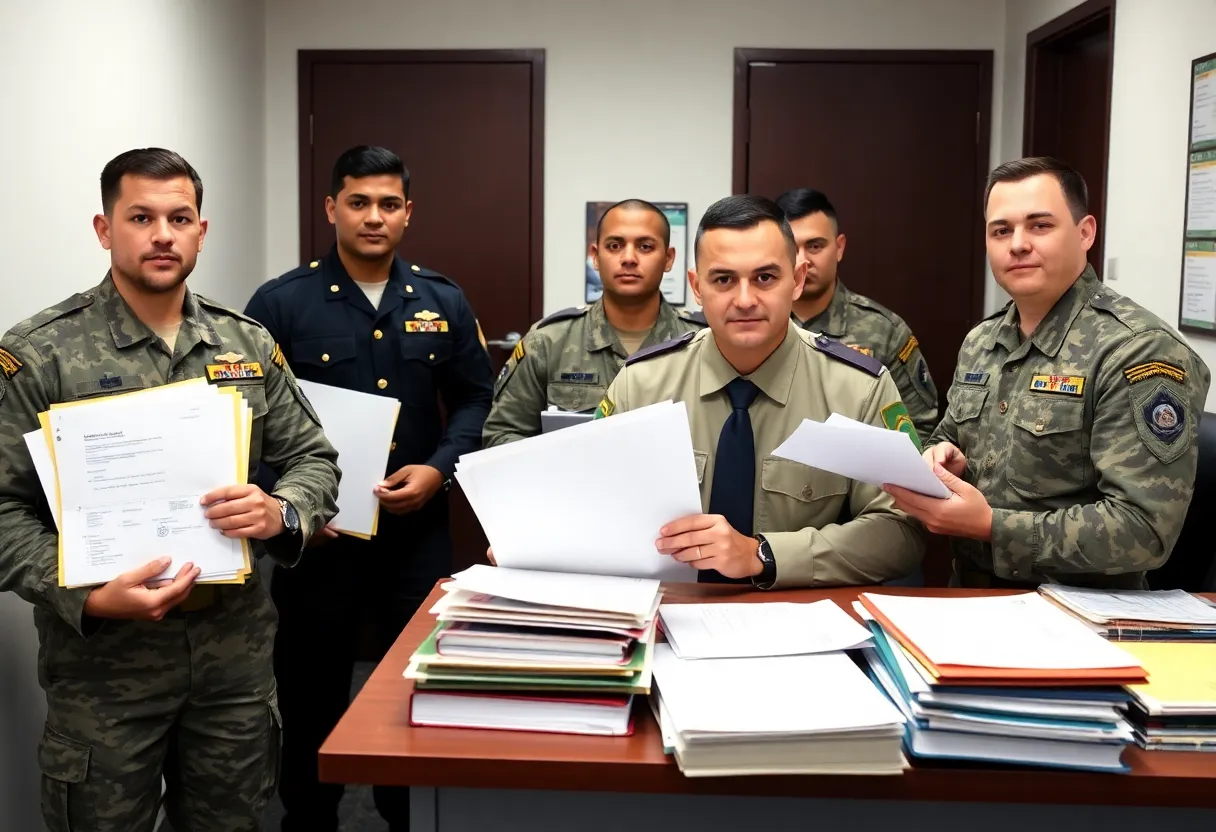News Summary
The Pentagon is deploying approximately 200 Marines to Florida to assist U.S. Immigration and Customs Enforcement with administrative tasks. This deployment is part of a growing trend of military involvement in immigration enforcement under the Trump administration, sparking concern among critics about potential civil rights violations and the use of military personnel in domestic law enforcement. The U.S. Northern Command confirmed these Marines, stationed in North Carolina, will provide logistical support without engaging directly in law enforcement activities. The situation raises questions about the military’s role in immigration policy enforcement.
Florida is set to receive around 200 Marines from the Pentagon to assist U.S. Immigration and Customs Enforcement (ICE) with non-law enforcement tasks. This deployment marks another step in the increasing role of military forces in domestic immigration enforcement under the Trump administration.
The U.S. Northern Command (NORTHCOM) confirmed on Thursday that these Marines would provide “administrative and logistical” support rather than engage directly in law enforcement activities. The Marines, drawn from Marine Wing Support Squadron 272 stationed at Marine Corps Air Station New River in North Carolina, are expected to arrive in Florida soon, though they had not reached the state as of Tuesday.
The “first wave” of support will focus strictly on clerical and administrative tasks, with the Marines restricted from interacting with individuals in ICE custody or becoming involved in any custody chain. This deployment follows a broader mobilization of approximately 700 troops, encompassing both active-duty and reserve personnel, to support ICE operations across Florida, Louisiana, and Texas.
This military assistance comes after a request from the Department of Homeland Security (DHS) seeking additional support for immigration enforcement efforts. The inclusion of military personnel in these tasks has generated significant concern and criticism regarding the treatment of migrants by federal authorities. Critics argue that such involvement could exacerbate tensions and lead to further complications in the enforcement of immigration laws.
Escalation of Military Role in Immigration Enforcement
The deployment of Marines is part of a trend toward greater military involvement in immigration enforcement that has been increasingly evident under the current administration. Previous operations have seen military support for various tasks, including deportation flights and repairs to barriers along the U.S.-Mexico border. These actions raise important questions about the military’s role in law enforcement, especially in light of the Posse Comitatus Act of 1878, which limits the use of federal military personnel in domestic law enforcement positions.
In addition to the deployment in support of ICE, similar military involvement has included assistance during anti-ICE protests in cities such as Los Angeles, where tensions have escalated during enforcement actions. California officials, including Governor Gavin Newsom and Los Angeles Mayor Karen Bass, have expressed their disapproval of military deployments, warning that they may inflame conflicts between law enforcement and immigrant communities.
Increased Demand for Support
Concerns regarding operational capacity have prompted the DHS to request support from the military, with the possibility of involving up to 20,000 National Guard troops for immigration enforcement. As the military apparatus continues to provide support to ICE, communities across the country are grappling with the implications of these actions.
As of the latest updates, there has been no confirmation from ICE concerning specific operations involving the Marines, including whether they will operate in areas like the Alligator Alcatraz immigrant detention camp located in the Florida Everglades. The absence of clarity raises further questions about the extent and nature of military involvement in immigration enforcement going forward.
Background Context
The increasing partnership between military branches and ICE marks a significant shift in how the U.S. approaches immigration enforcement. Advocates and legal experts worry about the potential for civil rights violations and the militarization of public services. Ongoing discussions about this relationship highlight a growing concern regarding the implications for both migrants and U.S. domestic policy.
As the situation evolves, the balance between immigration policy enforcement and the rights of individuals remains a point of contention both locally and nationally. The deployment’s immediate effects will be closely monitored by various stakeholders, including officials within state and local governments, advocacy organizations, and community members.
Deeper Dive: News & Info About This Topic
- Military.com: First Wave of 200 Marines Sent to Florida to Support ICE Operations
- Wikipedia: Immigration enforcement in the United States
- Newsweek: Trump Sends Marines to Florida for ICE Support
- Google Search: Marines deployed to Florida ICE
- The Daily Beast: Trump Sends Marines to Florida as Alligator Alcatraz Opens
- Google Scholar: Military and Immigration Enforcement
- ABC News: 200 Marines Sent to Florida for ICE Support
- Encyclopedia Britannica: Posse Comitatus Act
- Local 10: About 200 US Marines to Help ICE in Florida
- Google News: US Marines ICE Florida

Author: STAFF HERE ORLANDO WRITER
ORLANDO STAFF WRITER The ORLANDO STAFF WRITER represents the experienced team at HEREOrlando.com, your go-to source for actionable local news and information in Orlando, Orange County, and beyond. Specializing in "news you can use," we cover essential topics like product reviews for personal and business needs, local business directories, politics, real estate trends, neighborhood insights, and state news affecting the area—with deep expertise drawn from years of dedicated reporting and strong community input, including local press releases and business updates. We deliver top reporting on high-value events such as Orlando International Fringe Theatre Festival, Megacon Orlando, and Central Florida Fair. Our coverage extends to key organizations like the Orlando Economic Partnership and Hispanic Chamber of Commerce Metro Orlando, plus leading businesses in leisure and hospitality that power the local economy such as Walt Disney World Resort, AdventHealth, and Universal Orlando. As part of the broader HERE network, including HEREJacksonville.com, HEREPetersburg.com, HERETallahassee.com, and HERETampa.com, we provide comprehensive, credible insights into Florida's dynamic landscape.




